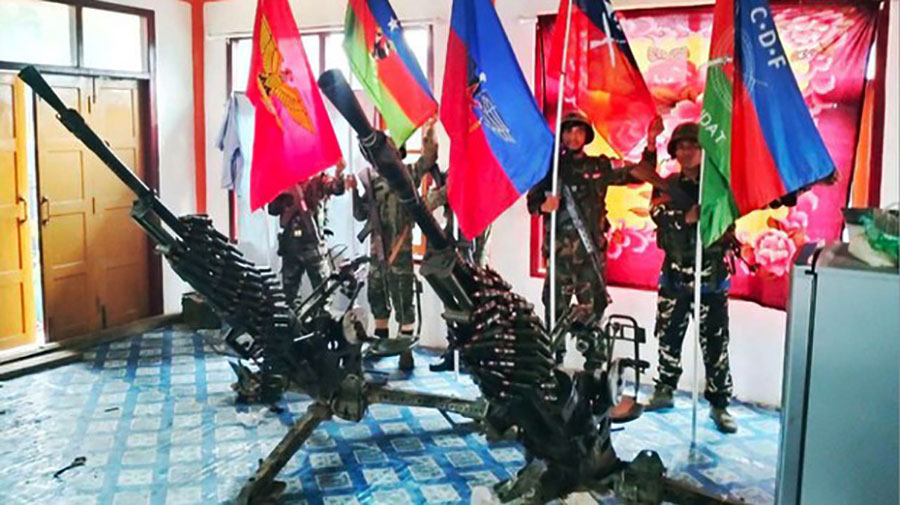- People with disabilities in Arakan State face severe livelihood hardships amid ongoing conflict
- Junta launches major offensive to retake strategic Mawchi mining town
- Extreme poverty drives Sittwe residents to dismantle abandoned houses for income
- Weekly Highlights from Arakan (Feb 23 to March 1, 2026)
- Over 300 political prisoners freed from 10 prisons nationwide
AA, Chin Resistance Forces Should Prioritise Fighting the Common Enemy
After the revolution against the military dictatorship succeeds, Chin State's sea exit will be available through Arakan State. Chin leaders should be especially aware that if the Arakanese and Chin people can have a peaceful relationship, it could contribute greatly to Chin State in terms of trade and economy.
30 Oct 2024

Written by Aung Thura
Paletwa in Chin State was the first township seized by the Arakkha Army (AA) during the battle for control of Arakan State and its neighbouring territories. On the other hand, the Chin Brotherhood Alliance has become stronger while the Chinland Council (CC) and its partners have launched various attacks against the AA.
In order to stop the AA from helping the Chin Brotherhood Alliance, the Chinland Council announced that the AA should leave Paletwa and Chin State more broadly, and has attacked the AA militarily, spread propaganda, and imposed trade restrictions. These actions have led to tensions between the Arakanese and Chin ethnic groups, as well as conflict between some of the respective armed groups claiming to fight for their interests.
Chinland Council Concerns
Paletwa Township is militarily important for the AA, and the ethnic armed group has established a formidable presence in Paletwa and northern Arakan State townships, carrying out military operations as early as 2015. When the AA first attempted to gain a foothold in Paletwa Township, the Chin National Front (CNF) did not oppose the Arakanese ethnic armed group as the Chin ethnic armed group was attempting to sign the Nationwide Ceasefire Agreement (NCA) with the then government.
Fighting between the AA and the Myanmar military began in Paletwa Township and Kyauktaw Township in Arakan State in 2015. Since then, Paletwa Township has become a military stronghold for the AA.
Paletwa also began to play a key military role for the AA in the battle for control of Arakan State, which began in earnest not long after the launch of "Operation 1027". The AA seized two junta tactical command bases in Paletwa Township in January.
The AA took control of the entire Paletwa area on January 14, two months after AA forces began their attacks on regime positions in Paletwa Township and in neighbouring Arakan State. Meanwhile, the Chinland Council, led by the CNF and their supporters, saw rising concerns over the Paletwa issue.
Among the nine townships of Chin State, which is a landlocked, mountainous and impoverished region, Paletwa Township is the only one to see significant foreign investment; the India-backed Kaladan Multi-Modal Transit Transport Project makes Paletwa Township the most promising prospect for development in Chin State. The Chin forces were worried about losing Paletwa and asked the AA to leave the area.
At a press conference in March, the AA spokesperson said the Arakanese ethnic armed group had developed a local administrative body involving the locals in Paletwa. Khaing Thukha, the spokesperson, added that the fall of the military dictatorship, which he described as the common enemy, was of paramount concern for all ethnic group stakeholders.
"Paletwa remains under the ULA's control to ensure peace and stability in the area," Khaing Thukha said, referring to the AA's political wing, the United League of Arakan (ULA). "Paletwa is an area where several different ethnic groups coexist. Therefore, we need to draw up plans bearing in mind the development and safety of all ethnic groups and prioritising inclusive governance."
A Workable Solution
Instead of the Chinland Council attacking the AA that controls Paletwa, it should fight to drive the military regime from Chin State once and for all, and find a solution to the Paletwa issue at the end of the revolution against the dictatorship.
Paletwa Township is host to perpetual territorial disputes between Arakanese and Chin people. The Otthalin Pagoda in Paletwa Township, located on the Indian border, is firmly written in the records of Arakan history as the end of the territory of Arakan.
From successive Arakanese kings until the era of independence, the Paletwa region was part of the Arakan border and was in Sittwe District. However, after independence in 1952, the then Prime Minister U Nu added Paletwa to the Chin Hills Special Division and became part of Chin State. Sixty percent of local people in Paletwa Township are Khumi people and 40 percent are Arakanese and other ethnic groups, and the common language is Arakanese.
There were two groupings led by the CNF and the Chin Brotherhood in the Chin revolution. The Zomi Federal Union/People's Defence Force (ZFU/PDF-Zoland), Chin National Organization/Chin National Defence Force (CNO/CNDF), and Chin National Council/Chinland Defence Force - Mindat (CNC/CDF-Mindat), Maraland Defense Force (MDF), Chin Defence Force (Kanpetlet) and Chinland Defence Force (Matupi) jointly declared the establishment of the Chin Brotherhood Alliance on December 30, 2023.
The CNF wanted the Chin armed forces that emerged after the coup to be under its control. Therefore, the CNF prohibits other forces from providing military training and selling weapons to the Chin armed forces.
Chin youths contacted the AA, built alliances, and received military assistance such as weapons and technology. This has become a concern for Chinland Council member forces. In particular, the capture of Matupi Town by the Chin Brotherhood and allied forces became worrying for the Chinland Council.
Considering that the Chinland Council is particularly concerned about the expansion of the Chin Brotherhood's area of control in Chin State, it has repeatedly asked the AA, which has an alliance relationship with the Chin Brotherhood, to leave Chin State.
'Paletwa Issue' Becomes Growing Source of Tension
Since the AA seized Paletwa Township, the CNF and its partners have become particularly concerned that the Paletwa area will fall out of their control.
The growing power of the Chin Brotherhood put pressure on the Chinland Council, and the Chinland Council members issued statements and protests to ask AA to leave Chin State and stop helping the Chin Brotherhood.
The Khumi people from Paletwa Township, the CNF/CNA subordinate forces based in Chin State, the Chinland Council and international partner Chin organisations are now in open conflict with the AA.
These organisations have attacked the AA with political undertones in addition to accusations of sexual assault, drug charges and allegations that have weakened the AA's political morale. Two detained AA fighters were allegedly tortured by the CNF/CNA and forced to confess to false statements. A video file reportedly showing the two AA fighters confessing to using drugs and raping women went viral on social media on August 1.
Describing the video as propaganda, AA spokesperson Khaing Thukha said the AA soldiers were tortured and forced to speak as coerced, and that the AA did not do injustice to any Chin people.
Trade Route Blockade
In the battle for control of Matupi, in which the Chin Brotherhood and the Chinland Council competed, the Chinland Council did not like the AA's participation in the attack on the side of the Chin Brotherhood. Chin youths revealed that the CNF, which supports them, planned to block trade into Arakan State with the help of the Central Young Lai Association (CYLA) of India.
The CYLA in Mizoram ultimately ordered a halt to trade with Myanmar through the Mizoram-Paletwa route on June 24. The AA said that this act constituted CYLA interference in Myanmar's internal affairs.
Despite attempts by the CYLA to exert their influence, the AA was unwilling to negotiate with a civil society group and negotiated directly with the Indian government to reopen the trade route, according to reliable sources.
India has reopened the trade route used to supply goods from India to Arakan State through Paletwa Township, after a blockade that lasted nearly one month. However, bans on the transport of fuel, pharmaceuticals and fertiliser remain in effect.
According to sources close to the Chin resistance organisations, there have been clashes between different Chin tribes in Mizoram over the blockade of trade routes with Myanmar.
Geographic Realities
Arakan State and Chin State border each other geographically; Arakanese people live in Chin State, and there are more than 200,000 Chin people in Arakan State. After the revolution against the military dictatorship succeeds, Chin State's sea exit will be available through Arakan State. Chin leaders should be especially aware that if the Arakanese and Chin people can have a peaceful relationship, it could contribute greatly to Chin State in terms of trade and economy.
India's Mizoram Chief Minister Pu Lalduhoma has called for developing amicable ties between ethnic Chin and Arakanese communities, saying that Chin people should make friends with the AA rather than fighting it. Pu said so as he met with Chin communities last month in the United States.
The Chinland Council, led by the CNF, must pay particular attention to the fact that the spreading of hate and propaganda during the revolution against a shared common enemy, the military dictatorship, does no favours vis-a-vis prospects for harmony among ethnic groups living in the two neighbouring states in the months and years ahead.
Instead, meeting and discussing a future of peaceful coexistence between the two ethnic groups, and uniting the divided Chin resistance, should be the focus.








.jpg)











